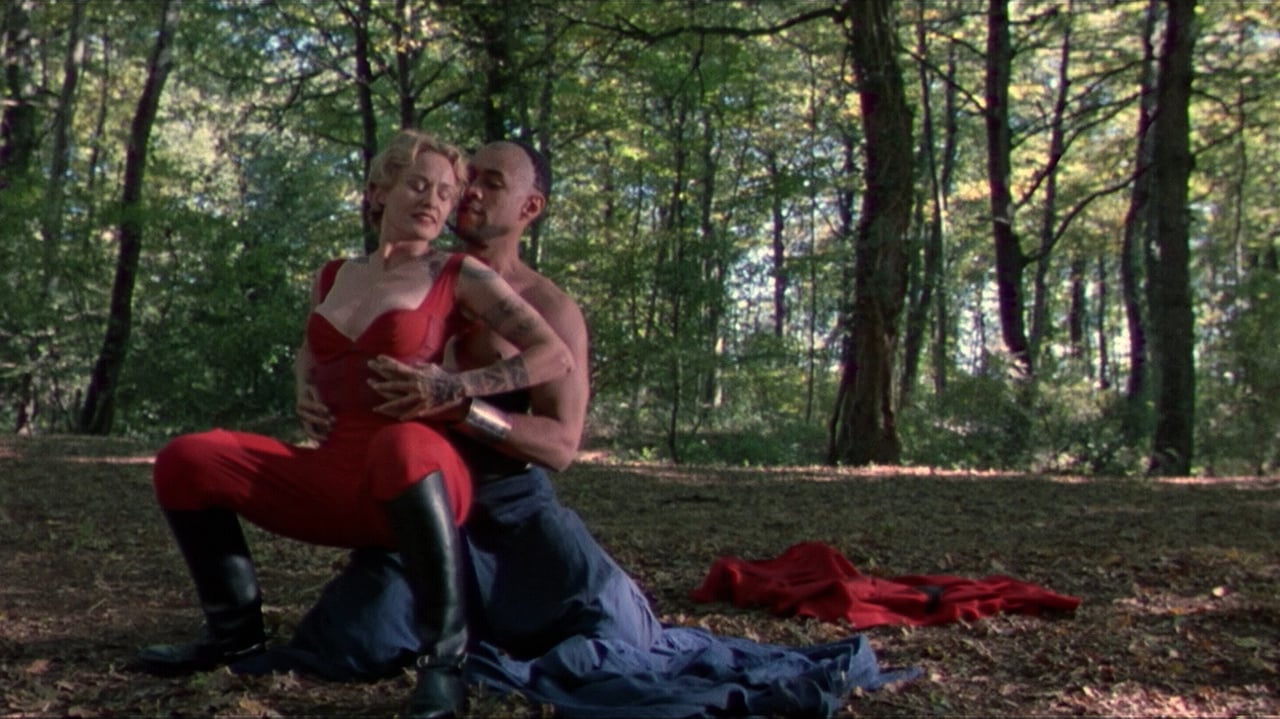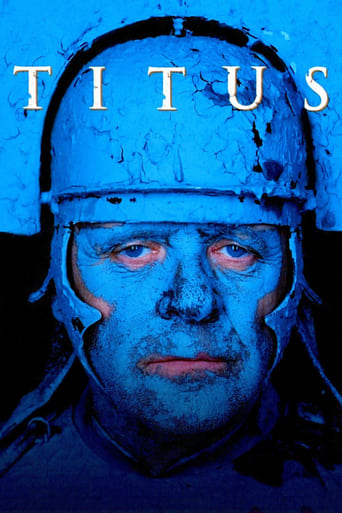

Excellent, Without a doubt!!
... View MoreBetter Late Then Never
... View MoreThe movie's not perfect, but it sticks the landing of its message. It was engaging - thrilling at times - and I personally thought it was a great time.
... View MoreIt’s fine. It's literally the definition of a fine movie. You’ve seen it before, you know every beat and outcome before the characters even do. Only question is how much escapism you’re looking for.
... View MoreI saw this film by accident just after it was released, and without knowing anything of the play "Titus Andronicus". I was staying in South India with friends of friends and it was such a hot uncomfortable evening that we sat under huge ceiling fans and decided to try cooling down by watching a film. There was nothing else to be done but sit sipping cool drinks and this was put on, and from the first bizarre scene with the boy playing with his toys, I was in love. What an absolute visual feast, the staging, costumes, anachronisms etc. I don't believe that Shakespeare should always be performed in some kind of Elizabethan dress, and I had no problem at all with the motorcade, auto rickshaw, loud hailers, pool tables or any of the modernity. I loved the mixture of costumes, Tamora in THAT gold outfit, The way the gentlemen had their toga draped over a made to measure suit, Saturninus' heavy make up (I love Alan Cumming anyway), the women's hunting costumes. Gorgeous to look at. And the scenery, those strange Roman ruins, especially at the intersection of the Roman Road, beautifully done. As to the story itself, shocking!!! Never knew a thing about it before but loved it, murder, more murder, rape, bloodlust, mutilation, and yet more murder!!It's certainly Bill having a "Tarantino" moment. THAT scene with Lavinia in the dead wood is so outrageous and horrific, and yet blimmin' well done. The lead actors are great, Hopkins has been accused of underplaying the role but I thought he got it spot on, Lange was also excellent, and Cumming is his usual self!! It's all pretty unsettling to watch but I found it utterly gripping. The language was not much of a problem and apart from a few quieter scenes which required more concentration, the plot is not difficult to follow at all. When it ended after its long three hours, I sat there pretty stunned and thought about it for weeks before ordering the DVD. It's not for everyone, but it will stay with you for a long time. I have now seen this film many times, and last night I put it on again and for the first time I shed a tear for poor old Andronicus when he first sees Lavinia after her "ravishment"One of my favourite films
... View MoreIt took 2 nights (not sequential) to get through the entire film.What stood out in my mind, was that it appeared to be a combination of the orgiastic scenes from Bob Guccione's "Caligula" and the 'period shifting' element from Kenneth Branagh's "Hamlet".I have mixed feelings about it, ranging from the 'lowest' (vocalizing, out loud, pure disgust that someone spent money to make this film) to 'highs' (being impressed with certain actor's scenes that stood out, and should have been employed in a better film). I especially appreciated Harry Lennix's moments on screen, who's dialogue had the most 'character' and best portrayed the words spoken.I'm not sure what the intention of the direction was, but feel that it was either just some San Francisco ("Frisco") Bay Area crap, which many other reviewers have also stated as being 'artsy' and 'high minded'. Or, that it was an attempt at allegory to display the decadence of the portrayed Roman period in relation to more contemporary times (again related to the "Frisco" culture). One should wonder what would result from a choice to give control of the nation, to the former mayor (Gavin Newsom).Though other reviewers have stated that 'this' is the worst film they've ever seen, I know that there are many more that would exceed it in that category. I would rate it as being alongside "War Horse", though I spent most of my time viewing 'that' film 'laughing out loud' at its absurdity, as apposed to 'cringing' at the bad elements of this one.The best thing I can say about the movie, is that the DVD quality was exceptional, which along with the modern upscaling of my Blu Ray player and LED television, presented an HD-like picture quality with beautiful color and clarity.
... View MoreThis is an incredibly gruesome movie, but then again the play upon which it was based is also incredibly gruesome. Titus Andronicus, the Shakespearian play upon which this movie is based is actually one of his least popular ones, so when I discovered that somebody actually made a movie of it I was thrilled, and it thrilled me even more when I saw it and was absolutely astounded by it. Anthony Hopkins plays the role of Titus Andronicus absolutely beautifully.The play is set in Imperial Rome, though the actual period is very speculative. It is suggested that it could be at its height as Titus has returned from a successful campaign against the Goths, and it could be near the end as the movie finishes with an invasion of the Goths. However I would be hesitant to call it an invasion simply because Lucius is asked to go to the Goths and raise an army to help Titus seek revenge for the crimes committed against him and his family. The story itself is fictional, however it is not something that Shakespeare created himself (The Tempest is his only original work). There are also numerous references to Greek mythology, particularly the cannibalistic meal at the conclusion.Titus is a movie about vengeance, and it is more so than Hamlet because most of the characters have a bone to pick with at least one of the other characters. In fact it is about how being consumed with hatred and vengeance is a vicious circle with is constantly descending until there are no survivors. The Emperor Saturninus is vengeful because he has been denied the woman that he wants, simply because she loves his brother, but because he has been denied, he takes it out on Titus, a loyal and faithful general. The Goth Queen seeks vengeance because Titus sacrificed her older son despite her pleas, and when she exacts her revenge upon the Adronici, she earns Titus' wrath.The play seems to shift about halfway through, and I believe the cinematography captures this brilliantly. The movie does not set the action in a set time or place, it is the modern world, but it is a world torn apart by violence and anger. It is still Rome, but it is a Rome of the imagination, and the movie is bookended by scenes of the action taking place in a Colosseum, which places the film clearly into the realm of the imagination. This is good as it is further distancing ourselves from the violence erupting within the film. It has also been said, by the director, that the entire film is seen through the eyes of a child. In the play the child plays a minor role, but in the film, he is ever present. It opens with the child playing with toys, but the play becomes ever more violent, and in fact the entire room in which the child is explodes in a ball of fire, indicating the violence that is about to swallow the lives of the Andronici.The centre piece of the play is where Titus is pleading for the lives of his sons. He has previously killed a son, has seen his daughter raped and mutilated, and then watches with helplessness as two of his sons are lead off to be executed. It is all apart of the Queen's plan to destroy Titus' life. In this scene his brother, Marcus, is encouraging Titus to slay himself, this was common in the Roman Empire when somebody had been dishonoured and his life had been destroy. However Titus is strong in will, and will not desert those who have been wronged. He knows that he has been dishonoured, but he knows that to kill himself is to give up, and especially leave his beloved daughter unavenged.There seems to be no redeeming features in any of the characters, though none of them are strictly villains. Even Aaron, the Moor and the Queen's lover, is motivated by jealousy in that his lover has been stolen from him. However he considers himself a wicked man, and when he faces execution he is more that willing to spill his guts that to remain loyal. However, when he is finally given his punishment, he even repents of any good deed that he may have done. I don't sympathise, or even empathise with any of the characters. True, Titus has shown nothing but loyalty to his emperor, but has only been a victim of circumstance, or so it seems. The key here is the sacrifice of the Queen's son. Granted, human sacrifice was not tolerated in Rome, at all, that is one of the reasons they went to war with Carthage, so it is tempted to believe that Titus went overboard, until we consider the play. Titus is convinced that it is something that he needs to do, and he cannot back out of it, though I still cannot help thinking that maybe, just maybe, the sacrifice of a human was not necessary.
... View MoreJulie Taymor is a designer, not a director. She lavishes all her creative energy on scenery, props, costumes and other inanimate objects. She can treat human beings as stage-dressing (the lock-step soldiers, the orgiastic revellers), but she cannot cast them properly or convince them to give good performances. Anthony Hopkins murmurs, rants and snarls without once achieving significant emotion; Jessica Lange and Harry Lennix can barely speak, let alone fill their roles; Colm Feore (Canada's idea of a major classical actor) does nothing with his apostrophe to Lavinia; and Alan Cumming is not convincing as a heterosexual. In brief, Taymor's film is a characteristic specimen of postmodern Shakespeare: heavy on production design, but dramatically and histrionically mediocre. One cannot do justice to Shakespeare through imagery alone, a truth that postmodern auteurs seem unable to grasp. And Titus, of all plays, is about flesh and blood, the very elements that leave Taymor at a loss.
... View More